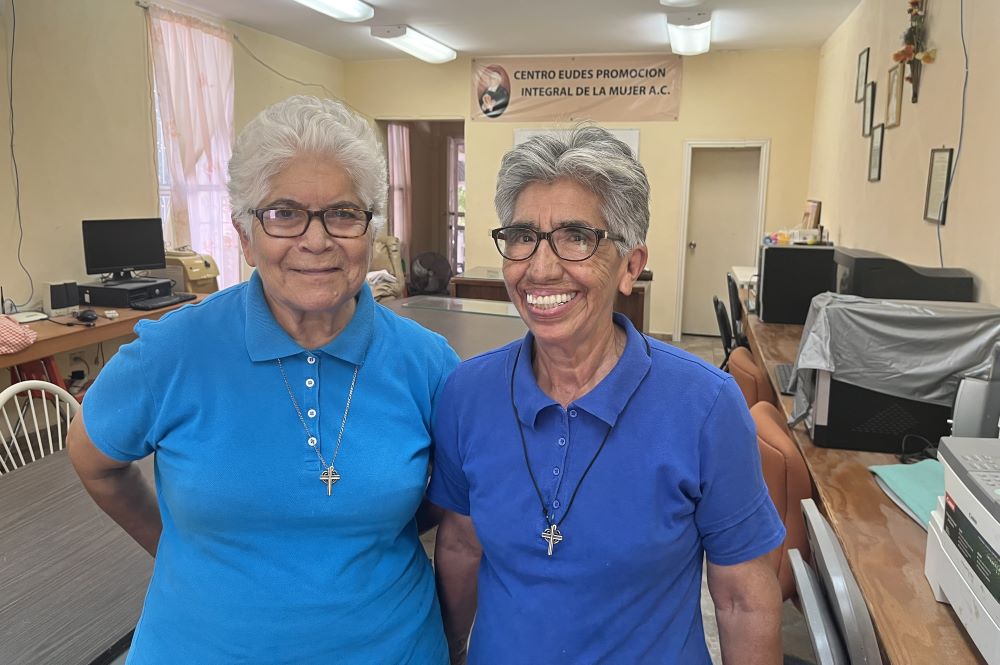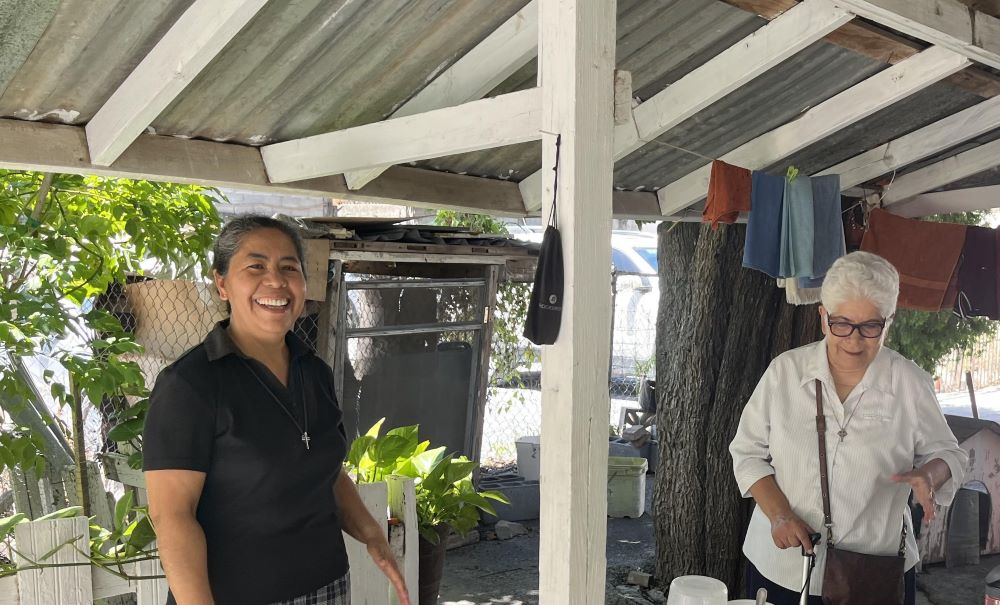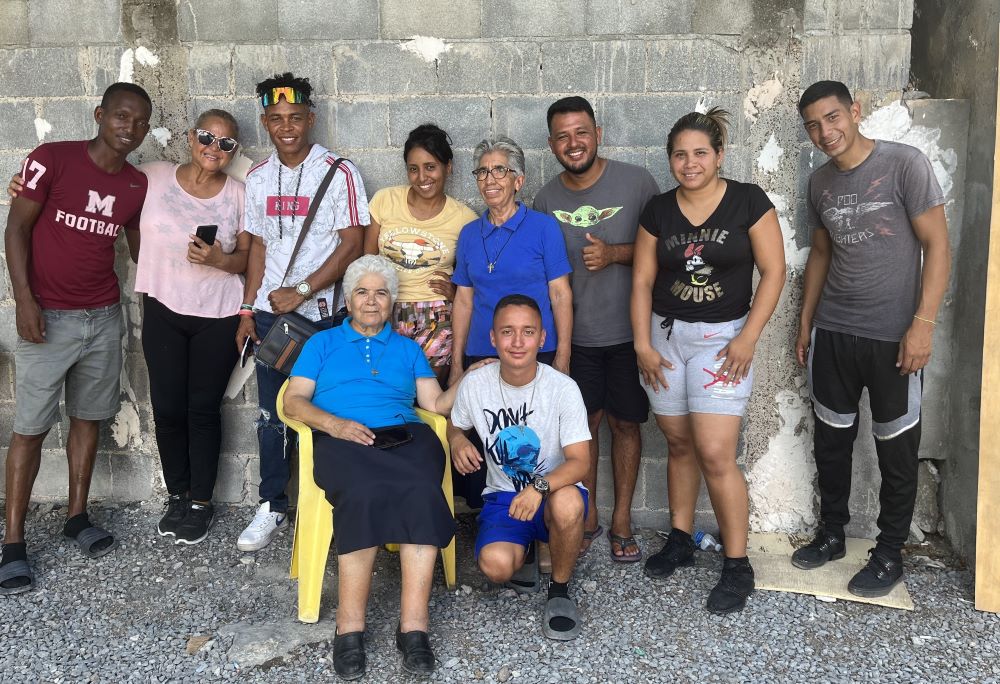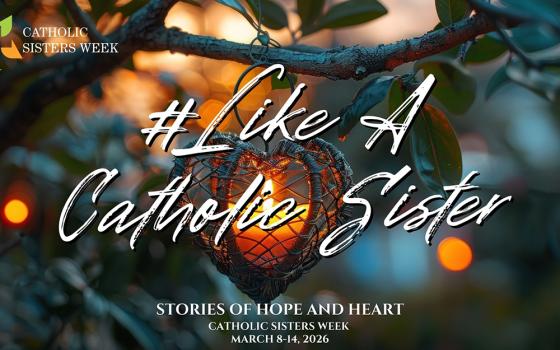
Sr. María de la Luz González Díaz, left, stands with Sr. Obdulia Guerrero Jiménez at the Eudes Center, founded as a non-profit organization in 2006 by the Sisters of Our Lady of Charity of the Good Shepherd to provide academic education and personal development for women in prostitution in Nuevo Laredo, Mexico. (GSR photo/Luis Donaldo González)
The Sisters of Our Lady of Charity of the Good Shepherd arrived three decades ago in the border town of Nuevo Laredo, Mexico, to show God's love and bring accompaniment and flourishment to female victims of domestic violence, prisoners or those involved in situations of prostitution.
"We are here to protect, help and heal the life of every woman who suffers violence or is mistreated in any part of her dignity," said Sr. María de la Luz González Díaz, who throughout her 58 years of religious life has accompanied vulnerable women.
Originally from Zacatecas, Mexico, González Díaz professed her first vows in 1965 and since then has worked in different cities in Mexico and the Ivory Coast, where she spent 14 years working with women in situations of prostitution.
González Díaz first arrived in Nuevo Laredo in 2003. The same year, she succeeded in getting the Catholic Church to enter the city's red light district, also known by locals as "la zona." After that, she remained to accompany and celebrate the faith with the women and men working there.
"It was slow work," González Díaz said. "It took them two and a half years to trust me. I was never afraid to approach because I always realized that when I was with them, I would receive rather than give."
To minister to these women, the sisters founded Centro Eudes [Eudes Center] in 2006, focused on bringing elementary education and personal development for women in situations of prostitution, said Sr. Josefina López Arredondo, the community's superior.
The arrival of the pandemic in 2020 made it impossible for the sisters to continue their work in "la zona." However, this has not prevented their work of welcoming and accompanying women in difficult situations. "Today, we continue listening and bringing human and psychological accompaniment to women suffering domestic violence." López Arredondo said. "Lately, we also provided humanitarian aid to migrants passing through this border."
According to media accounts, prostitution and trafficking continue to grow in Mexico. However, there are no official sources that show the situation of the last decades in "la zona," said Cynthia Martínez Leija, author of the book Galactica. Testimonials from the Red Light District.
Regardless of the difficulties, ministering to women in situations of prostitution or victims of trafficking in Nuevo Laredo has been vital to González Díaz's life and vocation.
"Ministry with the women in la zona has given me life," González Díaz said.

Sr. Josefina López Arredondo, superior of the community, is seen with Sr. María de la Luz González Díaz in the convent's garden of the Sisters of Our Lady of Charity of the Good Shepherd in Nuevo Laredo, Mexico. (GSR photo/Luis Donaldo González)
Global Sisters Report: How did you begin your work in "la zona"?
González Díaz: Always accompanied by lay people and other sisters, I started going to the zone in 2003.
We started visiting all the casas de paso [brothels] until I found la Patrona [she boss]. I introduced myself to her and asked her permission to visit the women, and she agreed.
The idea was to go room by room, and if they received us, we would stay and chat. We always did it with much respect, so we gradually gained the girls' trust.
I realized many things and saw they had faith, so as Holy Week approached, I thought we could celebrate it with them.
We broke down the imaginary barrier that existed and our work continued. Over the years, we went from small celebrations to living Stations of the Cross among the bars. We always included everyone, even the bar owners.
The women would say to each other: "Look how God is so great that even here he comes to see us."
It was an intense experience for everyone.
How did you approach women?
I would arrive, greet them and ask "How are you? How are you feeling?" I would always tell them: "I am a religious sister and I consecrated myself for you, so when you need me I will be here."
I realized that many of them were there because they had no other option to work and many others were forced to be there since they were brought here by trickery and then told that they had to work to pay off a debt.
The pimps or "padrotes" pay them whatever they want, and that's why the girls' debts don't end quickly.
Advertisement
How did the Centro Eudes come about?
When the women trusted me, I asked some of them: "Girls, wouldn't you like to change your life?"
One of them told me: "Madre [Sister], if we don't know how to do anything and we don't have an education, who will accept us?." I didn't know how to solve it, but I told them I would change that.
I went to talk to the local education office to explain what I wanted to do and they gave me excellent teachers. I also went to ask for support from schools of computation, beauty, sewing and nursing. We asked all the male teachers for absolute respect so the girls would get to know another kind of man.
I also talked to the pimps so that they would allow the women to study.
That's how the Eudes Center came about, and through there, we were able to help the women obtain primary education. Today, many of them already have a family, a job or a house. Occasionally, they come here to visit me.
Is God's mercy present in la zona?
God's mercy there is greater than anywhere else. Let us not forget that God never abandons anyone, at least those who suffer the most.
I remember one Good Friday when a woman in her 70s said, "I am cursed. Do you think God is going to accept me?" I told her that God truly loved her because Jesus Christ did not come for the healthy but for us, the sick and sinners.
When these women and men speak to us, they need us to see them with eyes of mercy. We must take them out of misery to give them love, life and help them with what they need to live in dignity.

Sr. María de la Luz González Díaz, sitting, and Sr. Obdulia Guerrero Jiménez, standing, appear with a migrant group from many Latin American countries in the convent's garden of the Sisters of Our Lady of Charity of the Good Shepherd in Nuevo Laredo, Mexico.(GSR photo/Luis Donaldo González)
Could you describe the heart of a woman in a prostitution situation?
It is a divided heart because they are women living and not living simultaneously. They are living to survive. Some women are forced to stay there, and others have no choice to raise their children. All of them live with fear and shame in their hearts.
One of them told me she was there to pay for her son's schooling. She did it on the sly, and her son went on to college. … Living with the guilt of engaging in prostitution is perhaps the most tremendous suffering these women endure.
Although people see them badly, they have a good and pure heart, unlike many of us.
Why does the church have to work in these places?
Because each person has the right to know God and be saved.
What happened to the one they wanted to stone or the Samaritan woman? Jesus went out to meet them.
So we have to follow the example of the Lord and forget that if we approach them we contaminate ourselves. I witness that it is the opposite, we receive greater things.
Do they advance us in the Kingdom of God?
Each one earns salvation according to her life; however, I have seen that when one of these women converts, she does it for real.
Most of them are victims of a society that has crushed them and has not known how to value them.
I do not doubt that they have a good heart. Jesus knew that and we can see it in the Gospel.







